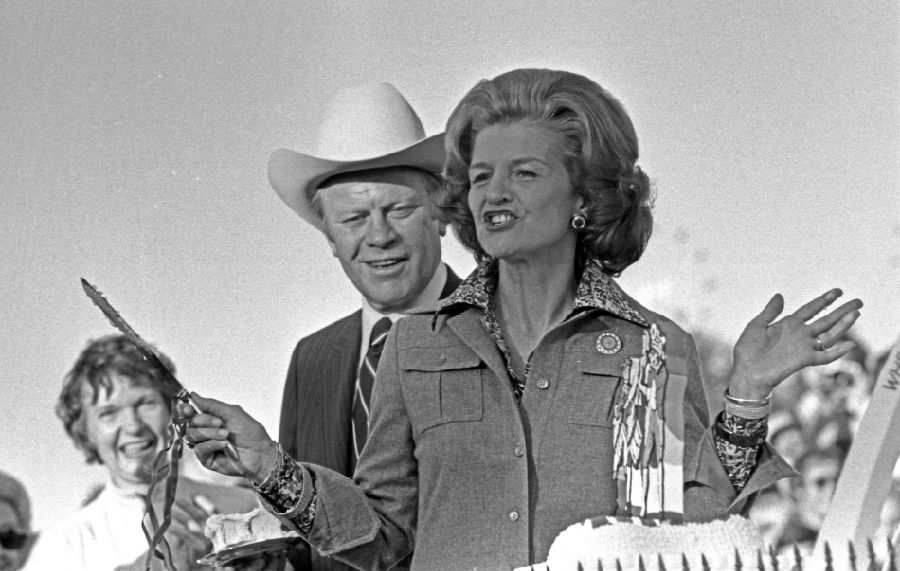She went to her bathroom, pulled out the four or five pills she normally took at noon, and swallowed them with a glass of water.
她走進(jìn)浴室,拿出平時(shí)中午吃的四五顆藥丸,和一杯水一起吞了下去。
Betty entered a Navy-run rehab based on Alcoholics Anonymous in April 1978. Four hospital beds—more like cots. Military grade.
1978年4月,貝蒂進(jìn)入海軍經(jīng)營(yíng)的戒毒所。四張病床——更像是小床。軍事等級(jí)的。

Betty's apprehension had been building, and when she saw the stark facilities and realized she was going to share a room and bathroom with three other women, she said, "I am accustomed to having a private room." (She agreed to sleep there.)
貝蒂的憂慮一直在積累,當(dāng)她看到冰冷的設(shè)備,意識(shí)到她要和另外三個(gè)女人共用一個(gè)房間和浴室時(shí),她說(shuō):“我已經(jīng)習(xí)慣了私人房間。”(她同意睡在那里。)
For group therapy, Betty was placed in Group Six—they called themselves the "Six-Pack." There were five men. Betty was the oldest, the only female.
在小組治療中,貝蒂被分在六組,他們稱(chēng)自己為“六塊肌”。有五個(gè)人。貝蒂年齡最大,是唯一的女性。
It was negotiated that Betty would not have to clean toilets—that seemed to cross a line for a former First Lady—but other than that there were few exceptions allowed.
經(jīng)過(guò)協(xié)商,貝蒂不必打掃廁所——這似乎對(duì)一位前第一夫人來(lái)說(shuō)太過(guò)分了——但除此之外,幾乎沒(méi)有例外。
Betty resisted admitting she was an alcoholic. "I can't do that," Betty told her doctor, her voice beginning to quiver. "I don't want to embarrass my husband."
貝蒂拒絕承認(rèn)她是個(gè)酒鬼。“我不能那樣做,”貝蒂告訴她的醫(yī)生,她的聲音開(kāi)始顫抖。“我不想讓我丈夫難堪。”
Jerry winced. He'd come to realize that he'd been enabling her for far too long. "No," he said, "it won't embarrass me."
杰里生氣了。他開(kāi)始意識(shí)到,他驕縱她太久了。“不,”他說(shuō),“這不會(huì)讓我難堪。”
On April 21, 1978, she publicly said that she was addicted to prescription medication and alcohol.
1978年4月21日,她公開(kāi)表示她對(duì)處方藥和酒精上癮。
America loved and respected Betty Ford, and her announcement brought home in a powerful way that this disease alcoholism could touch virtually any family.
美國(guó)人愛(ài)戴并尊敬貝蒂·福特,她的聲明以一種強(qiáng)有力的方式讓人們認(rèn)識(shí)到,酒精上癮這種疾病幾乎可以影響到任何一個(gè)家庭。
"I'm Betty and I am an alcoholic," she said at a group session. "And I know my drinking has hurt my family."
“我是貝蒂,我是個(gè)酒鬼,”她在一次小組會(huì)議上說(shuō)。“我知道我喝酒傷害了我的家人。”
As she said it out loud, a wave of relief spread through her. A year into recovery, friends broached the idea of her starting an alcohol treatment center.
當(dāng)她大聲說(shuō)出來(lái)的時(shí)候,一股如釋重負(fù)的感覺(jué)傳遍了她的全身。康復(fù)一年之后,朋友們提出了讓她開(kāi)辦一個(gè)酒精治療中心的想法。
Betty couldn't forget how being forthright about her breast cancer had helped thousands of women.
貝蒂無(wú)法忘記,她對(duì)乳腺癌的坦率幫助了成千上萬(wàn)的女性。
She realized that perhaps her personal battle with alcoholism and addiction could do the same thing. She and a partner raised $3 million.
她意識(shí)到,也許她個(gè)人與酗酒和毒癮的斗爭(zhēng)也能起到同樣的作用。她和一位合伙人籌集了300萬(wàn)美元。
The Eisenhower Medical Center offered several acres in Palm Springs, asking that the facility bear Betty's name.
艾森豪威爾醫(yī)療中心在棕櫚泉提供了幾英畝的土地,要求該設(shè)施以貝蒂的名字命名。
"Absolutely not," Betty said. "I'm new to recovery." In the back of her mind, she was also thinking, I'll never be able to drink again.
“絕對(duì)不行,”貝蒂說(shuō)。“我剛開(kāi)始恢復(fù)。”在她的內(nèi)心深處,她也在想,我再也不能喝酒了。
But her family was unanimous. "We're proud of you," they said. "Go for it." From the moment Betty agreed to put her name on the center, she took ownership.
但她的家人一致同意。“我們?yōu)槟愀械津湴粒彼麄冋f(shuō)。“試試吧。”從貝蒂同意把她的名字放在中心的那一刻起,她就擁有了所有權(quán)。
Betty chose the fabrics, the furniture, the rugs, the art.
貝蒂選擇了布料、家具、地毯和藝術(shù)品。
Before the opening, she realized there weren't soap dishes in patients' rooms, so she went to Kmart, Secret Service agents in tow, to buy soap dishes.
開(kāi)業(yè)前,她意識(shí)到病人的房間里沒(méi)有肥皂盤(pán)子,于是她去了Kmart,跟著的是特工人員,去買(mǎi)肥皂盤(pán)子。
Betty insisted there not be any private rooms—she had realized how important it was to have roommates and for no patient to be treated more special than any other because of wealth or stature.
貝蒂堅(jiān)持沒(méi)有任何私人房間——她已經(jīng)意識(shí)到有室友是多么重要,沒(méi)有病人因?yàn)樨?cái)富或地位而受到比其他任何病人都特殊的對(duì)待。
The Betty Ford Center opened on Oct. 3, 1982. She had an office, but you were more likely to find her chatting with patients at the coffee bar or walking around with a garbage bag, picking up any litter.
貝蒂福特中心于1982年10月3日開(kāi)業(yè)。她有一間辦公室,但你更有可能發(fā)現(xiàn)她在咖啡館和病人聊天,或者拿著垃圾袋四處撿垃圾。
Once a month, she gave a lecture to patients.
她每個(gè)月給病人做一次講座。
She'd walk into the auditorium and look out at the audience of people from all walks of life—truck drivers, housewives, actors, and musicians: "Hello, I'm Betty, and I'm an alcoholic."
她走進(jìn)禮堂,看著來(lái)自各行各業(yè)的觀眾——卡車(chē)司機(jī),家庭主婦、演員和音樂(lè)家:“你好,我是貝蒂,我是個(gè)酒鬼。”












